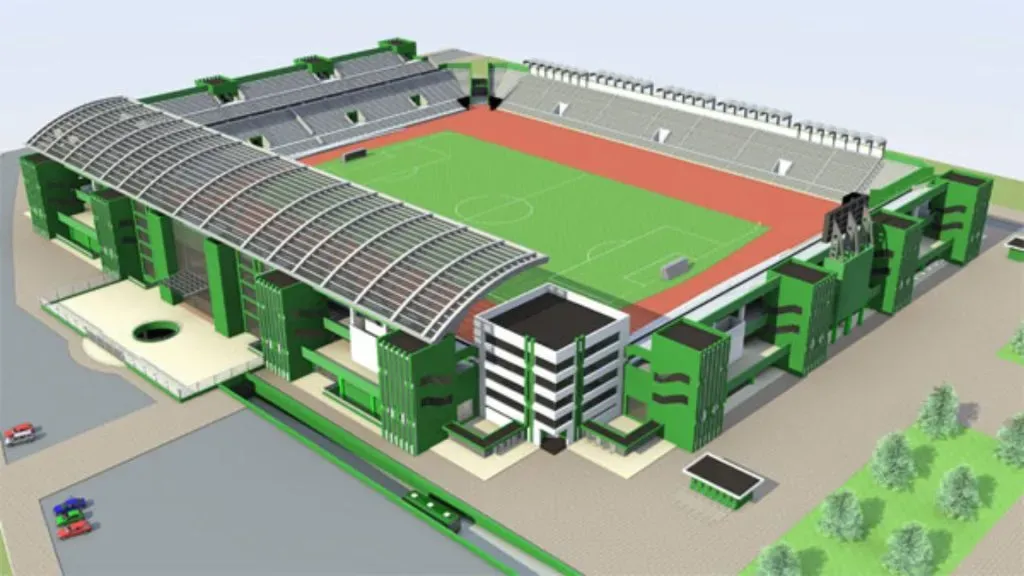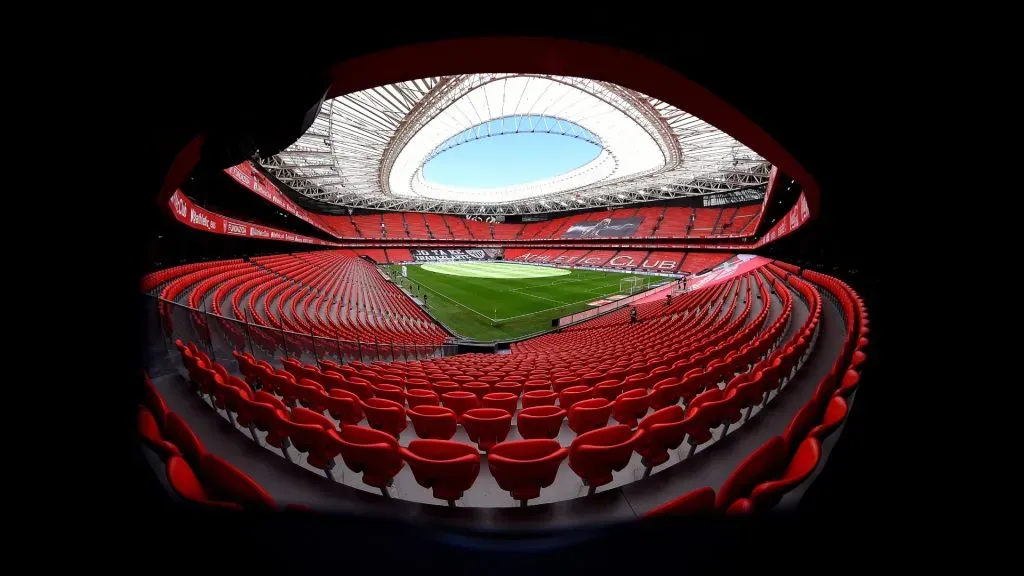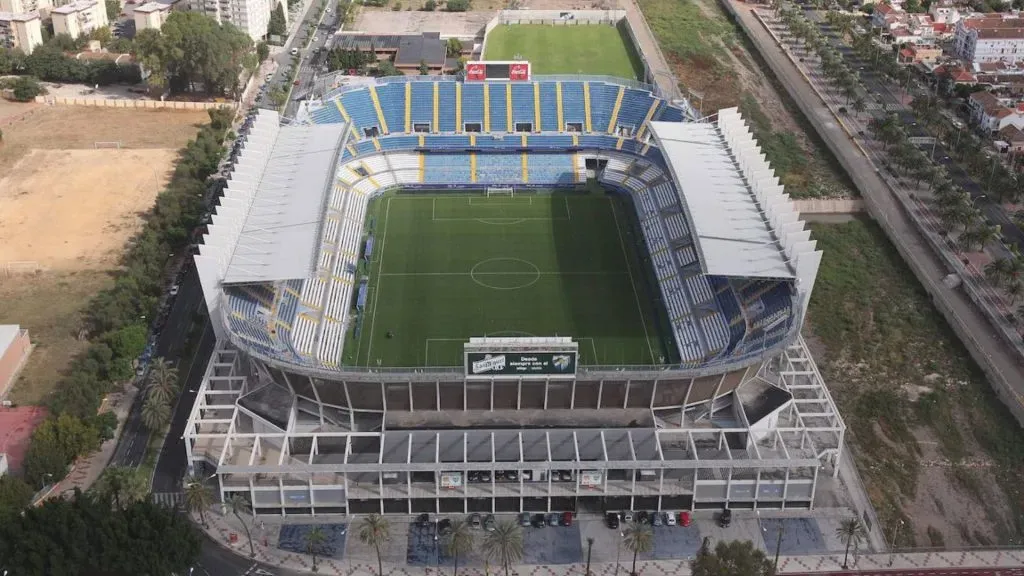In 2030 the FIFA World Cup will turn 100 years old. Brazil is the all-time winner of the cup with five titles, and Argentina is the current World Cup champion. It all began in South America in Uruguay and in more ways the one, the World Cup will return to South America as according to Conmebol, Uruguay, Argentina, and Paraguay will host 1 game each of the 2030 World Cup.
Then according to FIFA, the bid presented by Spain, Portugal, and Morocco will be accepted some time in 2024 and will become the main hosts of the 2030 World Cup.
The following list are possible venues for the 2030 tournament and in 2024 the final list of venues will be known. Here are the possible stadiums for the 2030 FIFA World Cup.
Más Monumental – Buenos Aires

Más Monumental (Getty Images)
The Estadio Más Monumental is home to River Plate in Argentina and is currently going through a major facelift by expanding capacity and placing new lights, seats, and accommodations. Still, for the 2030 World Cup even for one game River Plate’s home ground will need a major state of the art facelift.
Estadio Centenario – Montevideo

Estadio Centenario (Getty Images)
The legendary stadium is in desperate need of a facelift, built for the 1930 World Cup, the stadium is largely unchanged despite some new paint being plastered on from time to time. It is the stadium that will need the most investment if indeed a World Cup match is played there.
Estadio Defensores del Chaco – Asunción

Estadio Defensores del Chaco (Goal)
At 42,000 seats, the stadium will most likely need to be expanded and have the proper accommodations to host a World Cup match. The last renovation was in 2015 and while good for the national team and Copa Libertadores, Estadio Defensores del Chaco will need to be World Cup ready by 2030.
Estádio da Luz – Lisbon

Estádio da Luz (Getty Images)
Benfica’s impressive home ground has a seating capacity of 64,000 and has 156 executive seats and was opened in 2003. The stadium has the capacity to be upgraded to an 80,000-seat stadium in the future.
Estadio do Dragão – Porto

Estadio do Dragão (Getty Images)
At 50,033 capacity and with 96 executive seating, FC Porto’s home ground has been up and running since 2003. The stadium has very up-close seating and has a huge scoreboard to watch the match comfortably if need be.
Mohammed V Stadium – Casablanca

Mohammed V Stadium (GoalZZ)
Home to Raja CA and Wydad AC, the stadium has a capacity of about 46,000 and was built in 1955. Mohammed V Stadium will need a facelift to be World Cup ready for the 2030 tournament.
Stade de Marrakech – Marrakesh

Stade de Marrakech (Getty Images)
Home to Kawkab Marrakech and opened in 2011, at 45,000 capacity the stadium will also need a renovation. The stadium has an English Premier League feel to it taking its inspiration from that league.
Adrar Stadium – Agadir

Adrar Stadium (Getty Images)
With a capacity of 45,000 seats and home to Hassania Agadir, the stadium was opened in 2013 and was built originally to try to make it for the 2010 World Cup had Morocco been chosen to host the tournament.
Ibn Batouta Stadium – Tangier

Ibn Batouta Stadium (Getty Images)
Opened in 2002, Ibn Batouta Stadium is a near 68,000 seat stadium, named after the Moroccan scholar and explorer Ibn Battuta. The venue can be expanded to 80,000 seats.
Fez Stadium – Fez

Fez Stadium (Getty Images)
The stadium holds 45,000 seats and was opened in 2007, the complex around the stadium includes a media room, a first aid center, an infirmary, and a doping control room, while the stadium car park at the visitors’ disposal can accommodate up to 7500 cars and 350 coaches.
Kenitra Municipal Stadium – Kenitra

Kenitra Municipal Stadium (Skyscrapers)
At only 28,000 the stadium will need a facelift and increase in capacity to be World Cup ready. The stadium was renovated back in 2017 and is a multipurpose facility.
Camp Nou – Barcelona

Camp Nou (Getty Images)
Barcelona’s home ground will be completely renovated and built to be a state-of-the-art facility. By the 2030 World Cup the stadium will be in place and be one of the tournament’s central facilities.
Santiago Bernabéu Stadium – Madrid

Santiago Bernabéu Stadium (Getty Images)
The recently renovated Santiago Bernabéu Stadium is home to quite possibly the greatest club soccer team on earth, Real Madrid. Already a comfortable stadium, despite its large size, the Santiago Bernabéu Stadium is a perfect place to watch a soccer match.
San Mamés Stadium – Bilbao

San Mamés Stadium (Getty Images)
Opened in 2013, The San Mames seats close to 54,000 and has a very modern stadium feel to it. The stadium is equipped with a sophisticated lighting system on its exterior which can be programmed to illuminate the hundreds of panels on its facade (which by day are white) in solid colors, or to show flashing or moving graphics.
Ramón Sánchez Pizjuán Stadium – Sevilla

Ramón Sánchez Pizjuán Stadium (Getty Images)
Once the home of Diego Maradona, the Ramón Sánchez Pizjuán Stadium is considered one of the best stadiums in all of Spain. Renovated in 2017 it is one of the best grounds in the country.
Mestalla Stadium – Valencia

Mestalla Stadium (Getty Images)
Valencia’ s home stadium was last renovated in 2019 and has a capacity of just under 50,000. The stadium currently has a huge rat problem that will need to be settled.
Estadio Abanca Riazor – La Coruña

Estadio Abanca Riazor (Getty Images)
At just 35,000 seats, the stadium will need to be upgraded and expanded on. The stadium is the 13th-largest stadium in Spain and the largest in Galicia.
Estadio La Romareda – Zaragoza

Estadio La Romareda (Getty Images)
The home ground of Zaragoza will also need to be expanded as the ground currently has 35,000 seats. La Romareda boasts the bizarre claim to have Europe’s deepest goal nets, which stretch back four meters.
Estadio de Balaídos – Vigo

Estadio de Balaídos (Getty Images)
At 45,000 seats the Estadio de Balaídos is a jewel for Celta de Vigo, the stadium is currently going through its fifth renovation as it was built in 1928.
Estadio La Rosaleda – Málaga

Estadio La Rosaleda (Getty Images)
The Estadio La Rosaleda has a capacity of 30,000, it will need to be expanded and renovated. The stadium went through a facelift in 2010, the stadium was one of the venues of the 1982 World Cup.





